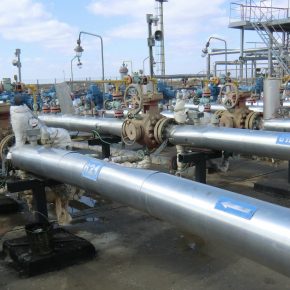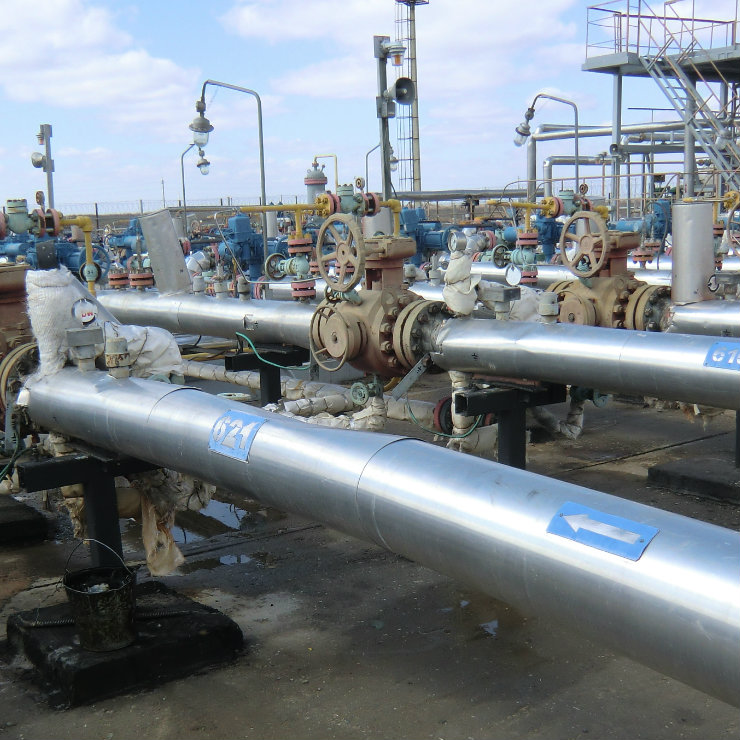Tydzień w gospodarce
Category: Trendy gospodarcze

Gazprom's pipeline, Astrakhan, Russia (JanChr, CC BY-SA)
Warsaw is upset over speculation Gazprom could dodge a large fine from Brussels. It appears that Brussels has decided instead to canvass opinion on Gazprom’s proposals to create a more competitive Central and Southeast European (CSE) gas market.
“Our initial assessment shows that the commitments are insufficient to remove the negative impact of Gazprom competition breach in the CSE markets, including Polish market,” the CEO of PGNiG Piotr Woźniak told the Financial Times.
“They may not make any significant contribution to change the situation that triggered the Commission action in 2012. We consider the Commission’s acceptance of those commitments as highly insufficient.” Woźniak added that PGNiG would “submit a detailed position providing minimum requirements to be imposed on Gazprom.”
Several CSE countries have campaigned for a tougher line in what is seen as a landmark case for newer EU member states.
Polish Energy Minister Krzysztof Tchorzewski said that the EU’s stance on Gazprom could also affect Polish plans to sell gas – imported via a new LNG terminal and planned pipeline linking to PGNiG’s Norwegian gas fields – to southern Europe.
PGNiG had also requested the European Commission undertake an antitrust investigation against Gazprom. “Gazprom should also sell shares in some of the companies that own the infrastructure for storage and transit of gas in the EU,” Woźniak said. “[we demand that] Gazprom divest of selected companies which own transport and storage infrastructure in the EU,” PGNiG’s wrote in a statement. „This solution should be specifically applied to infrastructure and issues connected with trade negotiations, to maintain exclusive control over gas supply routes to Central and Eastern Europe (e.g. the OPAL and Yamal-Europe gas pipelines), as well as gas storage facilities (e.g. Katharina).
Woźniak added that PGNiG wants the European Commission to fine Gazprom over violation of the anti-trust legislation and to create competitive conditions on the gas market. He also said that Gazprom’s „crimes” should retrospectively be calculated from 2004, but didn’t say how big any fine should be.
“The violations committed by Gazprom have been long-lasting and serious. They have caused considerable damage to the gas market in Central Europe. This applies both to the competition in the gas market and to the financial losses incurred by the recipients of commodity. We would like to emphasize that Gazprom has not refrained from violating the competition law and, until this day, the company has not complied with its provisions,” Woźniak said.
PGNiG shares the position of the European Commission presented in the press release of the EC Directorate General for Competition of 22 April 2015 that Gazprom has infringed antitrust laws in Central and Eastern Europe by partitioning Central and Eastern European gas markets, excessive pricing policy towards customers, conditioning gas supplies upon maintaining or taking control over gas infrastructure by Gazprom.
According to the provisions of the applicable law, any fine would be paid to the budget of the European Union and the affected companies would be given an opportunity to pursue any claims against Gazprom in Member States’ courts.
PGNiG also said it wants Gazprom to change the „Take or Pay” clauses by lowering the current maximum level of mandatory gas deliveries in long-term contracts for Central and Eastern European customers to a maximum of 75 per cent.
“The solution would restore competition between Western European energy companies which have signed flexible contracts with Gazprom and companies on which rigid conditions of long-term contracts have been imposed by Gazprom.”
In addition, PGNiG said the European Commission should commit Gazprom to fully comply with the provisions of the III Energy Package for the Nord Stream 1 and 2. “In particular, this should include ownership unbundling, the application of third-party access rules, as well as the implementation of network codes – the issues that the European Commission proposed to address in the Intergovernmental Agreement between the European Union and Russian Federation on Nord Stream 2.”
Warsaw argues that giving Russia more transmission capacity is against the EU solidarity on energy security.
Opal lands the gas sent via the 63 billion cubic meters (bcm) Nord Stream, allowing transmission across Germany and on to the Czech Republic. Currently, Gazprom is limited to using 50 per cent of Opal’s 36 bcm capacity, with the remainder auctioned to third parties. The EU announced that it will now allow the Russian company to potentially compete for a further 30-40 per cent.


